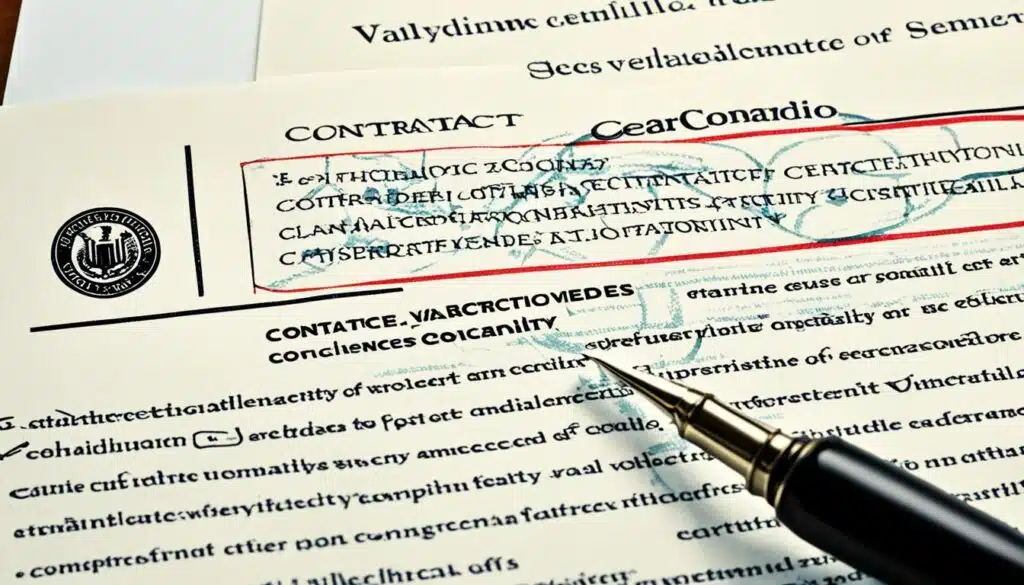Contract law is one of the most important legal concepts in the business world. Contracts determine everything from how employees are hired to how companies work together to how sales are made. Contracts are a legally binding agreement between parties to create mutual obligations that businesses and individuals use to protect their interests. Contracts outline the specific terms of engagement for a transaction and can also dictate legal consequences if a party tries to break the agreement.
Contract law is the subset of laws specifically regulating how contracts are created and enforced, covering things like how contracts are formed, what a document must contain to be considered a contract, who is eligible to enter a contract, what consequences exist for violating contracts, and what a contract can require of signatories. Essentially, contract law explains when contracts exist, when they’re enforceable, and what the wronged party can do if the other signatory ignores the terms of the agreement.
Also Read : What Are Your Rights In Criminal Law: Simple Explanation
Key Takeaways
- Contract law is a fundamental aspect of business operations, governing everything from hiring to sales transactions.
- Contracts are legally binding agreements that outline the specific terms of engagement between parties and the consequences of violating those terms.
- Contract law regulates how contracts are formed, what they must contain, who can enter into them, and the legal remedies available if a contract is breached.
- Understanding contract law is crucial for businesses to protect their interests, manage risks, and maintain successful partnerships.
- Effective contract management and lifecycle processes are essential for ensuring contract compliance and avoiding costly disputes.
Also Read : How Lawyer Provide Crucial Legal Representation In Criminal Cases
What is Contract Law?
At its core, contract law is the system of laws that govern the creation and enforcement of contracts. A contract is a legally binding agreement between parties to create mutual obligations that businesses and individuals use to protect their interests. These contracts outline the specific terms of engagement for a transaction, defining the rights and responsibilities of each party involved.
Also Read : Need Help After A Car Crash? How Can A Car Accident Lawyer Assist You?
Defining Contract Law
Contract law is the subset of laws that regulate how contracts are created and enforced. This includes guidelines on how contracts are formed, what a document must contain to be considered a contract, who is eligible to enter a contract, what consequences exist for violating contracts, and what a contract can require of its signatories.
Key Elements of a Contract
The three essential components of any contract are the offer, the acceptance, and the consideration. The offer is a clear, specific, and voluntary opportunity provided by one party to another, including a declaration of intent to enter a contract, the offeree’s information, what the offeror intends to provide, and the terms of the agreement. Acceptance can take the form of words, actions, or performance. The consideration of a contract is the value that is being provided, which can be financial, property, or services.
Offer and Acceptance
The offer and acceptance are the core of any contract. The offer must be clear, specific, and voluntary, while acceptance can be demonstrated through words, actions, or the performance of the agreed-upon terms. Once an offer is made and accepted, the parties have entered into a legally binding contract.
Also Read : How Do Lawyers Manage Conflicts Of Interest With Opposing Counsel?
Consideration
The consideration in a contract is the value that is being exchanged. This can take the form of money, property, or services. Without consideration, a contract is generally not legally enforceable.
Overall, contract law is the foundation for creating and maintaining business relationships, outlining the rights, responsibilities, and obligations of each party involved in a transaction. Understanding the key elements that make a contract valid and enforceable is crucial for any organization seeking to protect its interests and mitigate risk.
Validity and Enforceability
For a contract to be considered valid and enforceable, it must adhere to certain legal requirements. Firstly, the contract must conform to public policy and not violate any laws. A contract that requires one party to engage in illegal activities or conflicts with established public policies is automatically considered non-binding.
Also Read : Law Outside Counsel: Expert Legal Guidance
Conforming to Public Policy
The law of contract mandates that all contracts must be in alignment with public policy. This means that the contract terms cannot call for actions that are considered harmful or against the common good. Contracts that are deemed to be contrary to public policy are automatically rendered void and unenforceable.
Capacity to Consent
Another crucial element of a valid contract is that all parties involved must have the legal capacity to provide consent. Certain groups, such as minors or adults with mental limitations, are not assumed to have the capacity to enter into a binding contract. If a party lacks the necessary capacity, the contract may be considered unenforceable.
Understanding and Agreeing to Terms
For a contract to be valid, all parties must genuinely understand and agree to the terms of the contract. Mistakes, misrepresentations, or a lack of comprehension of the contract’s terms can prevent parties from providing genuine consent, potentially leading to the contract being nullified.
Overall, the principles of contract law require that a contract not only follows the appropriate structure but also meets certain requirements to be considered valid and enforceable. Careful consideration of these legal elements is crucial in ensuring the integrity and enforceability of any contract.
Breach of Contract
Once an enforceable contract is signed, all signatories are bound to the terms of the agreement. If one party fails to live up to the terms without a valid legal defense, they have breached the contract. There are two main ways to be in breach of contract: failure to perform as promised, such as not delivering payment by a specific date, and acting to prevent the other party from performing as promised, such as refusing to allow delivery vehicles onto the property. When someone breaches a contract, the other party can sue them for compensatory damages to recover the value of what they’ve lost due to the other signatory’s actions.
The law of contract establishes the legal consequences of contract breaches and provides remedies for the aggrieved party. Understanding the fundamentals of contract law and how to identify and address breaches of contract is crucial for businesses to protect their interests and maintain productive relationships with their partners, vendors, and customers.
| Type of Breach | Description | Potential Consequences |
|---|---|---|
| Failure to Perform | One party fails to fulfill their contractual obligations, such as not delivering payment or goods by the agreed-upon date. | The non-breaching party can seek damages for breach of contract to recover their losses. |
| Preventing Performance | One party actively interferes with or prevents the other party from fulfilling their contractual duties. | The non-breaching party may be able to seek damages for breach of contract or potentially have the contract voided. |
Understanding the common law of contracts and the various ways a contract can be breached is essential for contract management and ensuring contracts are legally binding and enforceable. By proactively addressing potential breaches of contract, businesses can mitigate risks, protect their interests, and maintain productive relationships with their partners.
Contract Interpretation Principles
The legal principles that govern contract interpretation can vary depending on the jurisdiction and type of contract, but some common principles include the plain meaning rule, the parol evidence rule, the contra proferentem rule, principles related to course of performance, course of dealing, and usage of trade, and the concept of implied terms.
Plain Meaning Rule
The plain meaning rule states that contract terms should be given their ordinary and plain meaning. This means that the language of the contract is the primary source for interpreting the parties’ intent, and courts will not look beyond the four corners of the document unless the terms are ambiguous.
Parol Evidence Rule
The parol evidence rule restricts the use of evidence outside of the written contract to interpret its terms. This rule generally prevents the introduction of prior or contemporaneous oral or written agreements to vary, contradict, or add to the terms of a written contract that appears to be a complete integration of the parties’ agreement.
Contra Proferentem Rule
The contra proferentem rule provides that any ambiguities should be resolved against the party that drafted the contract. This rule is based on the principle that the drafting party should bear the risk of any lack of clarity in the contract language.
Course of Performance and Trade Usage
Principles related to course of performance, course of dealing, and usage of trade may be used to interpret ambiguous terms in a contract. These principles look to the parties’ actual conduct and the customs of the particular trade or industry to give meaning to the contract language.
Implied Terms
The concept of implied terms allows courts to imply terms into a contract to give effect to the parties’ intentions or fill gaps in the agreement. This can occur when a term is necessary to give business efficacy to the contract or to reflect the presumed intention of the parties.
Overall, contract interpretation is a complex process that requires careful analysis of the contract language, surrounding circumstances, and applicable legal principles. Understanding these core interpretive doctrines can help ensure that the true intentions of the contracting parties are given effect.
Contract Law
Contract law is a fundamental element of maintaining business relationships and protecting organizations. Understanding what makes a contract valid and the consequences of violating an agreement can help keep a company on track and prevent legal conflict. Well-written contracts support better partnerships and mitigate risk both inside and outside the organization. Implementing contract law can be complicated, especially if an organization manages many agreements, but a functional contract lifecycle management solution can help stay on top of different elements of contract law and ensure that contracts are not accidentally breached.
| Key Elements of Contract Law | Description |
|---|---|
| Elements of a Contract | The three essential components of any contract are the offer, the acceptance, and the consideration. |
| Validity and Enforceability | A contract is valid if it follows the appropriate structure and meets certain requirements, such as conforming to public policy and having parties with the legal capacity to consent. |
| Breach of Contract | If one party fails to live up to the terms of a contract without a valid legal defense, they have breached the contract and may be liable for compensatory damages. |
| Contract Interpretation Principles | Legal principles like the plain meaning rule, parol evidence rule, and implied terms guide how contracts are interpreted by courts. |
Purpose of Contracts in Business
The primary purpose of a contract is to formalize new relationships and delineate the various legal obligations that each party owes to the other. Contracts serve as a reliable record of the rights, responsibilities, and commitments of the signatories, transforming private promises into legally enforceable agreements.
Record of Rights and Obligations
Contracts provide a clear and comprehensive documentation of the parties’ rights, responsibilities, and obligations. By memorializing the terms of the agreement, contracts create a legally binding record that can be referenced in the event of a dispute or the need to enforce the agreement.
Legally Enforceable Promises
One of the key purposes of a contract is to make private promises legally enforceable. Without a contract, such promises would lack legal recourse, leaving the parties vulnerable to potential breaches. The contract transforms these promises into binding obligations that can be enforced through the legal system.
Formalizing Business Relationships
Contracts play a crucial role in formalizing the relationship between parties, detailing how the relationship will be maintained, what obligations must be fulfilled, and for what consideration. This formalization is essential for businesses looking to build new partnerships, extend existing ones, and close important transactions.
Ensuring Payment and Revenue
Contracts play a crucial role in guaranteeing payment and securing revenue streams for businesses. By meticulously defining the terms of a transaction, a contract can ensure that the parties involved fulfill their financial obligations. This not only protects the company’s bottom line but also strengthens the overall business relationship.
Guaranteeing Payment
A well-crafted contract can include provisions that guarantee payment, such as specific deadlines, late fees, and dispute resolution mechanisms. This reduces the risk of non-payment or delayed payments, which can significantly impact a company’s cash flow and financial stability. By securing these terms upfront, businesses can have confidence that their invoices will be paid in a timely manner.
Negotiating Favorable Terms
The contract negotiation process allows businesses to advocate for terms that are favorable to their interests. This may include securing more favorable pricing, extended payment terms, or specific clauses that protect the company in the event of a breach. By leveraging their understanding of contract law, businesses can often negotiate contracts that maximize their revenue potential and minimize financial risks.
Efficient Contract Process
Implementing a robust contract lifecycle management system can streamline the contract process, ensuring that all agreements are properly executed and monitored. This can include automated reminders, digital signatures, and centralized contract repositories. By streamlining the contract process, companies can reduce the administrative burden, minimize errors, and focus on delivering high-quality products and services to their customers.
Also Read: Define Counsel: Legal Advice Explained
Conclusion
Contract law is a fundamental aspect of legal systems, governing the creation and enforcement of agreements between parties. It ensures that promises made in contractual agreements are legally binding and provides remedies in case of breaches. Key principles include offer, acceptance, consideration, and mutual consent. Contract law facilitates commercial transactions, promotes fairness, and fosters trust in business relationships. Understanding contract law is essential for individuals and businesses to navigate legal obligations and protect their interests. As commerce evolves, contract law continues to adapt, addressing new challenges and complexities in various industries. Ultimately, it underpins the stability and predictability essential for economic and social interactions.
FAQs
Q: What is the importance of contract law in business?
A: Contract law is essential in business as it governs the agreements made between parties, ensuring clarity, enforceability, and protection of rights.
Q: How does common law influence contract law?
A: Common law principles play a significant role in shaping contract law by setting precedents and standards for contract interpretation and enforcement.
Q: What are the key elements of a written contract?
A: A written contract typically includes the identities of the parties involved, the terms and conditions of the agreement, signatures, and any relevant clauses or provisions.
Q: How do the principles of contract law define a contract?
A: The principles of contract law establish the requirements for a valid contract, such as offer and acceptance, consideration, legal capacity, and lawful object.
Q: What is the significance of contract management in business?
A: Contract management involves overseeing the lifecycle of contracts, from creation to execution, to ensure compliance, risk mitigation, and successful outcomes.
Q: How can parties form a contract?
A: Parties can form a contract by reaching mutual agreement on essential terms, exchanging consideration, and demonstrating intent to be legally bound by the agreement.
Q: What are the key principles of contract interpretation in law?
A: The principles of contract interpretation guide courts in understanding the parties’ intentions, resolving ambiguities, and applying objective standards to contractual language.










